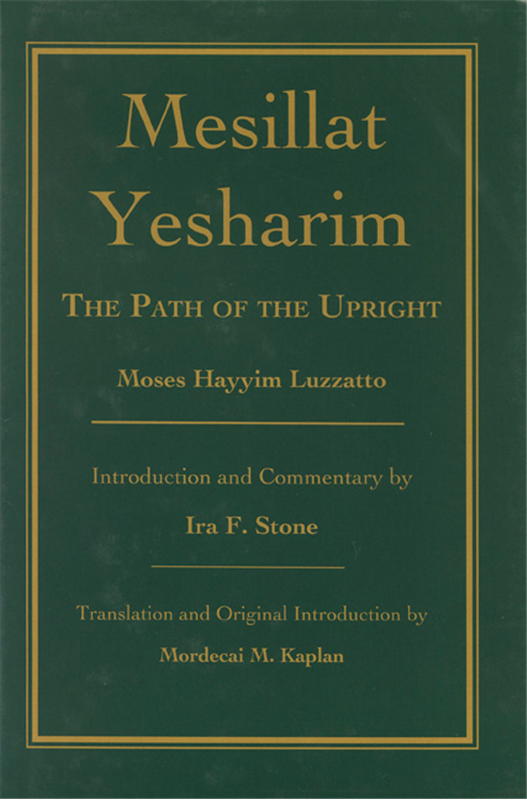About the Book
Connecting the wisdom of tradition with contemporary spirituality.
Mesillat Yesharim is a classic of Jewish ethical literature. Written by one of the leading kabbalists of the late Middle Ages, it is also a window into the kabbalist’s understanding of the connection between ethics and mystical vision. Luzzatto, one of the great Hebrew stylists of his time, is acknowledged by some as the first writer of modern Hebrew; thus Mesillat Yesharim is also important for its place in Hebrew literature.
This translation, published originally in 1936 by JPS, is a landmark in Jewish publishing. It made this Hebrew text finally available to English readers, and it gave us insights into the groundbreaking work that Kaplan did in orienting American Jews to the deep connection between ethical living and religious belief. It is no wonder that this book has become the centerpiece of the modern-day Mussar Movement, which inspires so many on their spiritual path.
Rabbi Ira Stone, consummate teacher and stirring speaker, is a major force in the resurgence of the Mussar Movement. In his introduction, he presents Luzzatto and Mesillat Yesharim in their historical context, and gives us new insights into Kaplan’s emerging theology. Stone also explains the principles of reading that he uses in his commentary and teaching to make this medieval text so inspiring to readers today.
This volume contains the original Kaplan translation, as well as those sections of the text that Kaplan omitted, along with Stone’s new commentary. The original Hebrew text is in the back of the book.
Praise
By republishing the classic (and, in fact, publishing the Stone commentary for the first time), JPS has resurrected one of Judaism’s great books. This should be the first of a series. Thank you, JPS and Rabbi Stone.
—CJ Magazine
This translation, published originally in 1936 by JPS, is a landmark in Jewish publishing. It made this Hebrew text finally available to English readers, and it gave us insights into the groundbreaking work that Kaplan did in orienting American Jews to the deep connection between ethical living and religious belief. It is no wonder that this book has become the centerpiece of the modern-day Mussar Movement, which inspires so many on their spiritual path.
—Jewish Media Review
Readers will find Stone’s ideas thought-provoking.
—Jewish Eye
Ira Stone has breathed new life into this classic of Jewish ethical literature. His introduction places Mesillat Yesharim and Kaplan’s translation of it in their proper historical and philosophical contexts. His running commentary to Luzzatto’s text is lucid and informative, helping contemporary readers discover how this influential work can continue to guide and inspire us today.
—Louis E. Newman, John M. and Elizabeth W. Musser Professor of Religious Studies and Humphrey Doermann Professor of Liberal Learning, Carleton College
Readers with an interest in rabbinic thought, Jewish philosophy, and Jewish ethics will find much to engage them. Stone provides the tools for the reader to easily and independently access Luzzatto’s great classic.
—Jewish Book World
Moses Hayyim Luzzatto
Rabbi Mordecai M. Kaplan
Mordecai Kaplan was born in Lithuania and immigrated with his family to the United States in 1889. He was ordained at the Jewish Theological Seminary (JTS), and received a master’s degree from Columbia University. He first served as associate rabbi of Kehillath Jeshurun, an Orthodox synagogue in New York, and later joined the faculty of JTS. Kaplan continued teaching and writing until his death in 1983, at the age of 102.
Learn more about Rabbi Mordechai Kaplan’s legacy at the Reconstructionist Rabbinical College website.
Ira F. Stone
Ira F. Stone is rabbi of Temple Beth Zion-Beth Israel, Philadelphia. He has been a lecturer in the department of philosophy at the Jewish Theological Seminary and is adjunct and visiting lecturer in modern Jewish thought at the Reconstructionist Rabbinical College. In addition to numerous articles, Stone has published two volumes of poetry and is the author of Seeking the Path to Life, Reading Levinas/Reading Talmud (JPS, 1998), and A Responsible Life: The Spiritual Path of Mussar.

